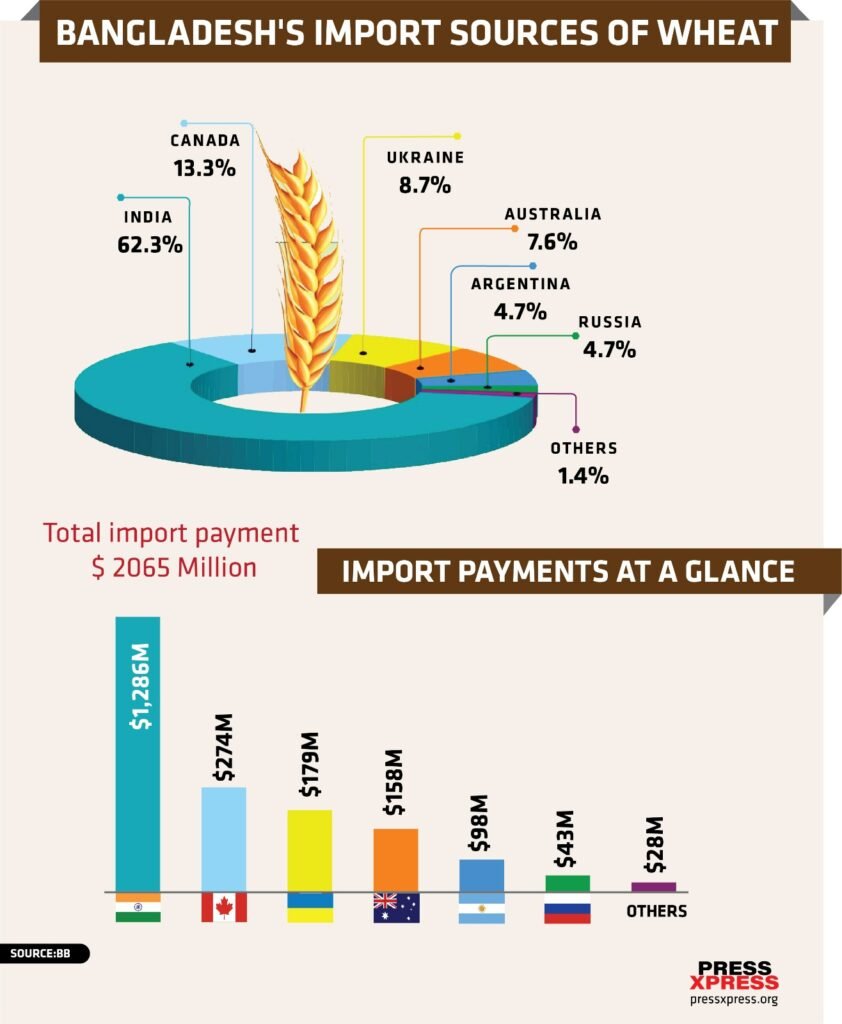The recent collapse of a dam in Ukraine has sparked concerns and caused a surge in wheat prices in the international global wheat market, posing challenges for local importers in the country already grappling with a dollar shortage. The intensifying conflict between Russia and Ukraine has further compounded the situation, potentially jeopardising the renewal of the Russia-Ukraine grain deal and exacerbating the global supply shortage. As the crisis unfolds, Bangladesh needs to be prepared to mitigate the impact and ensure a stable wheat supply. The government’s initiatives in securing alternative sources and managing the situation are crucial in addressing the potential risks.
YOU CAN ALSO READ: THE HIGH YIELD OF PADDY THIS SEASON: A SUCCESS STORY
Dam collapse and its impact on the global wheat market
The destruction of a dam along the Dnipro River in Russia-controlled Southern Ukraine on June 6 has had far-reaching consequences on the region’s grain production and supply. The flooding caused by the dam collapse is estimated to damage crops on approximately five lakh hectares of land, severely disrupting the country’s supply chain. The incident also jeopardises the renewal of the Russia-Ukraine grain deal, which expired on May 18, further straining the global wheat supply.
Uncertainty surrounding the grain deal?
Despite Russia’s initial positive stance toward renewing the grain deal, escalating attacks on Ukraine have raised doubts about the future of the agreement. Ukraine has responded with counter-attacks, exacerbating the tensions between the two countries. The absence of an official announcement regarding the renewal of the contract has further exacerbated concerns in the international wheat market. As Russia and Ukraine are major suppliers of wheat globally, the unresolved status of the grain deal adds pressure to an already strained supply situation.
Rising wheat prices and local importers’ concerns
The surge in wheat prices in the global market following the dam collapse has raised alarm bells among local importers in Bangladesh. Redwanur Rahman, General Manager of Bashundhara Food and Beverage Ltd., expressed concern over the potential increase in wheat prices, which could further burden importers already struggling due to the dollar crisis. The combination of these challenges poses a significant threat to wheat availability in the country. “If the supply situation in Ukraine weakens again due to the dam collapse and the raging war, the price of wheat in the world market may increase, which will put us under pressure.”
Government initiatives to ensure wheat supply?
The government of Bangladesh has taken proactive measures to address the potential risks associated with the disruption in the global wheat market. Despite having an adequate stock of wheat at present, the government remains cautious and monitors the situation closely. Officials from the Ministry of Food assured that there is currently no need to worry about imports, emphasising the government’s preparedness. Wheat imports have been conducted through government-to-government (g2g) agreements in the past, and the same approach is planned for the next fiscal year. However, if global prices remain high, import costs at the g2g level could increase. Wheat is generally imported into the country at the government and private levels. An official of the Ministry of Food said, “Currently, the government has a good stock of wheat, which is why there is no need to worry about imports right now.”
Challenges faced by Bangladesh in wheat imports
Bangladesh heavily relies on wheat imports to meet its annual demand of 65-70 lakh tonnes. In the previous fiscal year, Ukraine accounted for 8.7% of wheat imports, while Russia contributed 2.1%. During that period, around 62.3% of wheat was imported from India. However, due to the war and India’s halt in wheat exports for its own food security concerns, Bangladesh had to depend heavily on Russia and Ukraine. With India still not resuming wheat exports, the import situation remains vulnerable, heightening the risk for the country.
Preparing for a secure wheat supply must?
Bangladesh must proactively address the challenges posed by the Ukrainian dam collapse and the uncertainty surrounding the grain deal. Diversifying import sources, such as exploring alternative markets or negotiating new agreements, can help mitigate the risks associated with overreliance on a limited number of suppliers. Additionally, increasing domestic wheat production through agricultural reforms and technological advancements can enhance self-sufficiency in the long run. The government’s continued vigilance and proactive measures will be instrumental in ensuring a stable supply of wheat and protecting the interests of the local importers and consumers.
To conclude, the collapse of a dam in Ukraine and the subsequent disruption in the global wheat market have raised concerns and posed challenges for Bangladesh as it strives to secure a stable supply of wheat.
The potential risks associated with the unresolved Russia-Ukraine grain deal and the escalating conflict necessitate proactive measures and preparedness.
While the government’s initiatives, such as maintaining a good stock of wheat and exploring g2g agreements, demonstrate its commitment to addressing the situation, diversifying import sources and promoting domestic wheat production should be integral parts of the long-term strategy.
By taking these measures, Bangladesh can mitigate the impact of global market fluctuations and safeguard its wheat supply, ensuring food security for its citizens.



